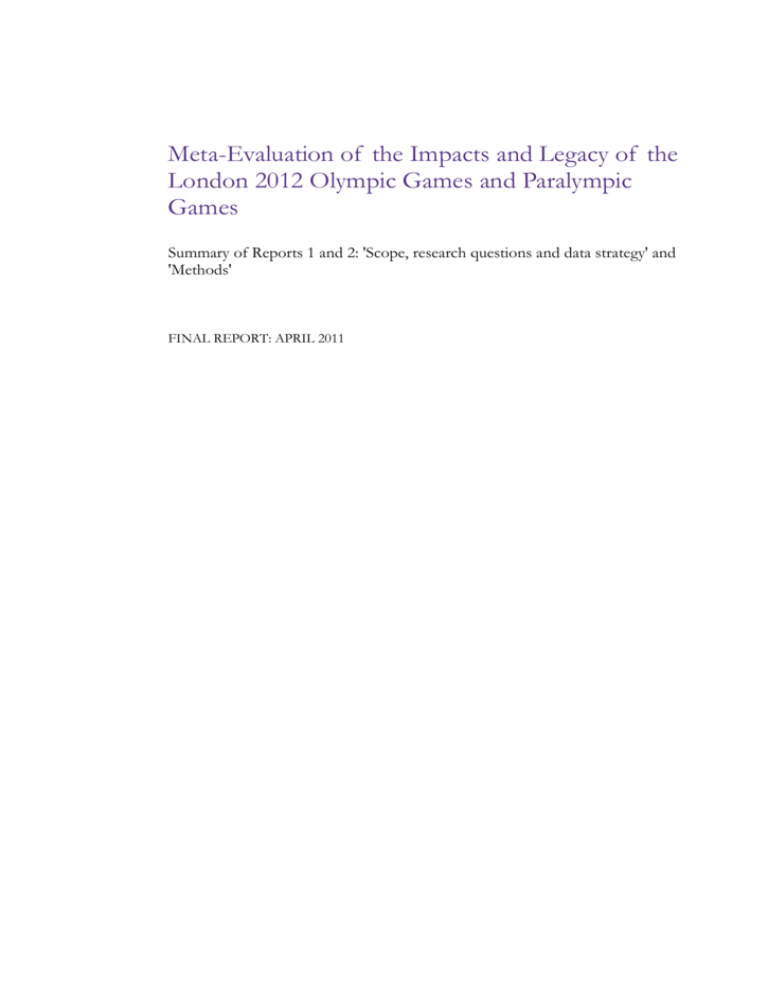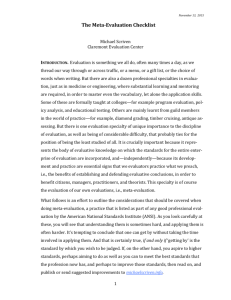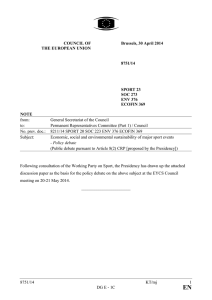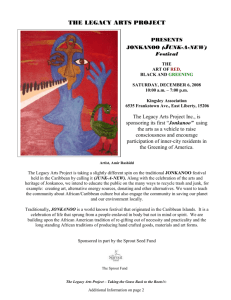
Meta-Evaluation of the Impacts and Legacy of the
London 2012 Olympic Games and Paralympic
Games
Summary of Reports 1 and 2: 'Scope, research questions and data strategy' and
'Methods'
FINAL REPORT: APRIL 2011
2012 Games Meta-evaluation: Summary of Reports 1 and 2
Contents
1
Introduction
1
2
Headline research questions
5
3
Harnessing the UK's passion for sport
7
4
Exploiting opportunities for economic growth
10
5
Promoting community engagement and participation
13
6
Driving the regeneration of East London
16
7
Timetable and outputs
20
8
Conclusion and next steps
21
This report has been prepared by:
Grant Thornton
Ecorys
Loughborough University
The information contained in the report is correct to the best of our knowledge
as at April 2011
© 2016 Grant Thornton UK LLP. All rights reserved.
1
2012 Games Meta-evaluation: Summary of Reports 1 and 2
1 Introduction
1.1
The 2012 Games legacy
In 2012 the UK will be hosting the Olympic and Paralympic Games ('2012 Games' or 'the
Games'). One of the key elements of London's bid for the Games was the commitment that
they would result in a lasting legacy for the whole of the UK. Thus from the outset the aim has
been for the Games to be not just a successful sporting event but also a catalyst for lasting
change, before, during and after the event itself. Government's plans for the legacy of the
Games focus on four areas: sport; the economy; community engagement; and the regeneration
of East London.
Figure 1-1: Legacy strategy
Sport
Economy
Harnessing the UK's passion for sport to
increase participation, particularly amongst
young people, and encouraging the whole
population to be more physically active.
Exploiting to the full the opportunities for
sustainable economic growth offered by
hosting the Games.
Community Engagement
East London regeneration
Promoting community engagement and
achieving participation across all groups in
society through the Games.
Ensuring that the 2012 Games and the
Olympic Park in particular become key
drivers of regeneration in East London.
Cutting across these four themes are the areas of sustainability and disability, and wider
strategic commitments around equality, inclusion and diversity.
In pursuit of the legacy objectives, a large number of policies and initiatives have been – and
continue to be – developed and implemented by a diverse range of organisations across the
public, private and third sectors.
This meta-evaluation has been commissioned by the Department for Culture, Media and Sport
(DCMS). However it will aim to report on impacts of activity being driven by a wide range of
organisations, communities and individuals, including:
Other Government departments;
The London Organising Committee for the Olympic and Paralympic Games (LOCOG)
and the Olympic Delivery Authority (ODA);
The British Olympic Association, British Paralympic Association, Sport England and UK
Sport;
Arm's length national delivery bodies such as the Arts Council, Visit Britain, Visit England
etc;
The Greater London Authority (GLA), London Development Agency (LDA) and the
Olympic Park Legacy Company (OPLC);
© 2016 Grant Thornton UK LLP. All rights reserved.
1
2012 Games Meta-evaluation: Summary of Reports 1 and 2
1.2
The host boroughs of Barking and Dagenham, Greenwich, Hackney, Newham, Tower
Hamlets and Waltham Forest;
Regional organisations across the nine English regions, the devolved administrations of
Scotland, Wales and Northern Ireland, and the Nations and Regions Group1;
Local authorities across the UK;
The Games’ sponsors and other businesses;
Many third sector organisations operating at national and local levels.
The purpose and scope of the meta-evaluation
The central aim of the meta-evaluation is to assess the legacy and other impacts up to 2013 of:
The expenditure on specific legacy interventions and programmes;
The investment in the infrastructure and venues required to host the Games;
The inspirational effects of staging the Games themselves
The meta-evaluation will synthesise the findings of individual 'project-level' evaluations –
commissioned outside of this study – in order to provide a comprehensive initial evaluation of
the additionality2, outputs, results, impacts and associated benefits of the investment in the
Games.
The meta-evaluation is taking a broad view, identifying indirect as well as direct effects,
unintended as well as intended consequences, and intangible as well as tangible effects. Impacts
are being estimated at the levels of the six host boroughs, London as a whole and the individual
nations and regions of the UK more generally.
Specific consideration is being given to the effects of legacy initiatives on target groups,
particularly people with disabilities and, more generally, to impacts on measures of equality,
inclusion and diversity.
The current study is considering the value for money of specific public sector legacy
programmes, aggregated to the thematic level where possible. An assessment of the overall
value for money of the Games – including the expenditure on infrastructure – will only be
practicable after many of the longer-term benefits have been realised. DCMS intends to
undertake a final evaluation looking at impacts up to around 2020 by which time there should
be more evidence available regarding the longer term impacts of the Games.
It has become clear that there will be important 'gaps' in the available evaluation evidence on
which the meta-evaluation can draw. This has required the development of a more diverse
collection of methods in order to undertake the study. These are highlighted in later sections.
The current study will inform policy making around the delivery of legacy benefits for megaevents and aims to advance methods of meta-evaluation. There are few, if any, examples of
similarly wide-ranging evaluations around the world, so this study presents an opportunity to
test new approaches and develop good practice. Methodological development and the
dissemination of learning are being supported through specific financial contributions by the
Economic and Social Research Council (ESRC) and the Ecorys Research Programme.
Established by Government and LOCOG, it includes representatives from each nation and region of the UK and was set up to
help achieve maximum benefits from the Games and their legacy across the UK.
2 How far the investment and its effects can be attributed specifically to the public sector investment in the Games.
1
© 2016 Grant Thornton UK LLP. All rights reserved.
2
2012 Games Meta-evaluation: Summary of Reports 1 and 2
1.3
The evaluation framework and methodological issues
The research methodology design has been informed by existing and well-established guidance
such as the Green Book3 and Magenta Book4, inputs from leading academics on metaevaluation methods, lessons from other evaluations of mega-events and the related research
literature.
The meta-evaluation will systematically review and synthesise a diverse set of individual
evaluations into a single overarching study. Each evaluation on which the work will draw will
ideally have broadly followed the principles set out in the 2012 Games Impacts and Legacy
Evaluation Framework prepared for DCMS5. This sets out the importance of assessing
additionality and the counterfactual6 and the required scope of each evaluation (Who is
impacted? Where and when are the impacts felt? How have the projects been designed and
delivered?), alongside criteria for deciding which legacy initiatives are in-scope for the metaevaluation.
Evaluations will then be synthesised using a common set of output, result and outcome
indicators, in order to answer a core set of research questions, paint a picture of the activity
underway across each legacy theme and aggregate the impacts wherever possible. This 'bottom
up' research approach will be supplemented with a combination of:
Analysis of management information data, monitoring reports and case studies, particularly
for major projects lacking evaluation;
'Top down' analysis of secondary data from National Statistics and established surveys, in
some cases involving the inclusion of additional questions to aid the interpretation of the
drivers of 'high level' trends;
Economic modelling to assess wider and longer term economic impacts, including effects
on nations and regions outside London;
Limited primary research of different types, including both survey work and a programme
of consultations7.
Figure 1-2: Meta-evaluation strategy
Economic
modelling
Secondary data
from existing
surveys
Assessment
of impacts and
lessons learnt
Synthesis
Management
Individual
information &
Evaluations
monitoring reports
Primary
Research
The Green Book, Appraisal and Evaluation in Central Government, HM Treasury.
The Magenta Book: Guidance Notes for Policy Evaluation and Analysis, Cabinet Office.
5 DCMS London 2012 Olympic and Paralympic Games Impacts and Legacy Evaluation Framework, produced in July 2008.
6 What would have happened in the absence of the Games.
7 The budget for primary research within the meta-evaluation study is limited, so we will need to be selective in deciding what to
commission directly. In parallel, we will also seek to influence primary research carried out across Government to include Gamesrelated questions.
3
4
© 2016 Grant Thornton UK LLP. All rights reserved.
3
2012 Games Meta-evaluation: Summary of Reports 1 and 2
Methodological challenges for the study include:
Achieving adequate coverage, within the bounds of practicality, across a vast range and size
of legacy activities;
The complexity of the task, in particular because of the interdependencies between the
different projects and programmes and their impacts;
The aggregation and synthesis of diverse information that will inevitably be of somewhat
varying quality;
Assessing the additionality of interventions and their impacts in a consistent fashion;
Ensuring that value for money and benefits are being measured using the most credible
evidence which is available;
Capturing and aggregating the 'intangible' benefits of the Games, such as organisational
change, inspirational effects and reputational gain, which may not be attached to any one
legacy initiative and thus evaluation.
Perhaps the most significant challenge arises from the patchy coverage of individual evaluations
relating to legacy activity. Significant gaps in the evidence were always expected and this was
planned into the study approach from the outset. However, as a result of public spending
restraint, access to data and differing cultures of evaluation amongst delivery organisations, it
has become clear that these gaps will be more substantial than was expected, and this will need
to be addressed by the meta-evaluation.
Our response to this challenge has been to place greater emphasis on the 'top-down' analysis,
whilst continuing to attempt to influence the evaluation plans of specific legacy initiatives and
drawing up contingency plans for targeted primary research.
© 2016 Grant Thornton UK LLP. All rights reserved.
4
2012 Games Meta-evaluation: Summary of Reports 1 and 2
2 Headline research questions
The headline research questions underpin the meta-evaluation. These have been developed
based upon the legacy objectives adopted by the previous and current governments, various
legacy activities underway or planned, stakeholder interviews, and the development of a set of
explanatory logic models for each legacy theme.
2.1
Logic models
The development of a logic model is an important evaluation research tool. It sets out the
expected causal links from legacy activities through to their outputs, results and impacts, based
upon 'theories of change' and existing evidence. Each logic model highlights a set of key
hypotheses which the research will seek to test. The overall logic model for the legacy strategy
is shown below.
Figure 2-1: Summary logic model for the 2012 Games legacy
Rationale
Outcomes/impacts
Gross to Net Conversion
The Games legacy strategy includes a major regeneration programme providing
jobs, homes, infrastructure, training and opportunities for UK businesses. This helps
overcome a coordination failure whereby firms and individuals are unwilling to invest
in the area even though if they all did together they would benefit.
- Economic benefits;
increased GVA, job
creation and jobs
safeguarded
- Better health outcomes
- Better quality of life/
improved wellbeing
- More cohesive and
inclusive communities
- More sustainable
communities.
- Need to take account of additionality extent to which opportunities would not
have been provided or not be available
from other sources in the counterfactual
scenario
The Games will act as a showcase for British expertise and capabilities, overcoming
similar problems with coordinated promotion to encourage inward investment,
tourism and improve export potential.
The Games will provide a focal point for national identity, representing Britain and
British culture to the world and creating civic and national pride that inspires new
attitudes and behaviours.
- Need some consideration of extent to
which programme of intervention is
responsible for observed outcomes
- Adjustments for displacement, leakage,
substitution, crowding out and multiplier
effects, as relevant
London 2012 will inspire greater participation in sport, providing positive externalities
through improved health.
Activities
Outputs
Results
- Sport: Harnessing the UK's passion for sport
- Economy: Exploiting opportunities for economic
growth
- Community Engagement: Promoting
community engagement and participation
- East London: Driving the regeneration of East
London.
- Engagement with individuals (sports,
culture and employment support)
- Improvements to sports infrastructure
- Engagement with businesses
- Creation of opportunities (volunteering,
disabled people, etc)
- Marketing and awareness campaigns
- Building of venues according to new
sustainable construction standards.
- Increased participation in sport and cultural activity
- Increased and sustained employment
- More new businesses and more contracts traded with
existing businesses
- Increased inward investment to East London and UK
- Increased visitor numbers to London and UK
- Regeneration of East London
- Greater sense of community cohesion and inclusion
- More sustainable behaviour of individuals and
businesses, reduced waste and fewer resources used
- Improved accessibility for disabled people in accessing
sport, culture, employment and transport.
2.2 Headline research questions
The headline research questions (overleaf) are considered to be of most interest to
Government, business and the population at large and will guide our approach to the metaevaluation.
The headline research questions that can be answered within the timeframe of this study are
labelled as 'to 2013' whilst those which require a longer term perspective are labelled as 'post
2013'. The spatial scope of each question is defined in terms of the geographical levels of the
host boroughs and the wider nations and regions of the UK.
© 2016 Grant Thornton UK LLP. All rights reserved.
5
2012 Games Meta-evaluation: Summary of Reports 1 and 2
Figure 2-2: Headline research questions
Question
Spatial
Scope
Temporal
Scope
Summary questions for each legacy theme
1. What have been the impacts of the Games8 on sport and
physical activity and in particular the development of mass
participation, competitive school and elite sport?
Nations, regions and
2. What have been the economic impacts of the Games,
host boroughs
particularly in terms of employment and gross value added
(GVA)?
3. What have been the social impacts of the Games,
particularly in terms of volunteering, the cultural sector and
community engagement?
4. What have been the impacts of the Games on East London, Host boroughs
and in particular socio-economic and organisational change?
Cross-cutting questions
5. How far have the beneficial impacts so far accrued to their
intended target groups/communities (including across
measures of equality, inclusion and diversity)?
6. How far have the Games changed attitudes to disability, and
increased the participation of disabled people in sport, the
economy, volunteering and culture?
7. How far have the Games contributed to sustainable
development, in particular through demonstration effects and
the encouragement of behavioural change?
8. In what ways have the 2012 Games and associated activity
contributed to well-being?
9. What have been the impacts of the staging of the Games on
the international profile and reputation of the UK, London
and East London?
To 2013 and
Post 2013
To 2013
As defined by legacy
theme
To 2013
Nations, regions and
host boroughs
To 2013
Nations, regions, host
boroughs and overseas
To 2013 and
Post 2013
To 2013 and
post 2013
Study conclusions
10 (a). How far have the investments in legacy initiatives
represented value for money? (b). Up to 2020, how far has the
overall investment in the Games represented value for money? Nations, regions and
11. How far have the impacts of the Games been sustained in host boroughs
practice – and what, if any, further/consequential impacts
have emerged (for example, on health)?
12. What lessons can be learned about how to maximise the
benefits to the host country and city from the staging of megaevents, particularly in terms of organisational lessons and
change?
(a)To 2013
(b) Post 2013
Post 2013
To 2013
In addition to the headline questions outlined above, specific and more detailed questions
within each of the four themes have been developed. These detailed questions are set out in full
in Report 1. The findings from the detailed questions will inform the answers to the headline
questions. The remainder of this report summarises the methods that have been identified
within each of the legacy themes to answer the research questions.
8
The Games is defined as the combination of preparing for and staging the Games and the package of legacy initiatives.
© 2016 Grant Thornton UK LLP. All rights reserved.
6
2012 Games Meta-evaluation: Summary of Reports 1 and 2
3 Harnessing the UK's passion for sport
Headline research question: What have been the impacts of the Games on sport and physical activity and in
particular the development of mass participation, competitive school and elite sport?
3.1
Legacy activity
The legacy plans in the sport theme centre on harnessing the UK's passion for sport and
encouraging physical activity. Taking into account these legacy plans and related initiatives, and
logic models, the meta-evaluation research is organised around the following sub-themes:
Participation. The legacy aims are to increase competitive sport in schools and boost
grassroots participation. Key initiatives include the £135 million Places People Play
Lottery-funded programme being delivered by Sport England, the School Games, which
aims to deliver a four-tiered series of competitions by 2012, and Deloitte’s Parasport,
designed to increase access to disabled sport.
Infrastructure. The legacy aim is to improve sporting infrastructure, including the venues,
coaches and volunteers required to stage the Games and support elite sport and mass
participation in the future. Beyond the Olympic venues, there will be investment in
community and world leading sports facilities and coaches through Places People Play,
whilst the Youth Sport Trust is running a host of school-based projects to boost human
capital, including the Young Ambassadors. 2012 sponsors are also investing in
infrastructure, for example through adiZones9.
Elite. The legacy plans are to support elite athletes in the run up to the Games and
maintain a world class high performance system in the UK. Principal measures include UK
Sport’s Mission 2012 framework, providing extra resources and targeted support for the
National Governing Bodies for sport, and initiatives to strengthen talent pathways,
including UK Sport Talent 2012 projects and the Playground to Podium Framework for
disabled people.
International. This aims to give young people around the world access to sports
opportunities, through physical education, sport and play, and help build the capacity of
overseas governments to develop better sports strategies. At the heart of this sub-theme
lies the International Inspiration initiative.
Sport and physical activity participation rates have remained broadly static since 2005 but there
are significant differences in participation by age, gender, ethnicity, occupational status and
disability (see Figure 3-1 for examples).
9
Outdoor multi-sports facilities in the shape of the London 2012 logo.
© 2016 Grant Thornton UK LLP. All rights reserved.
7
2012 Games Meta-evaluation: Summary of Reports 1 and 2
Figure 3-1: Participation in sport and physical activity in England
70%
Undertaken any sport in the last 4 weeks
60%
50%
40%
30%
20%
10%
0%
All
Male
Female Disabled London Regions
2005
All
All
All
All
2006
2007
2008
2009
Source: Taking Part
3.2 Methodology and challenges
Benefits from sports legacy interventions revolve around increases in participation and elite
achievement, reputational gains, health and subjective well-being, and other wider outcomes
such as community cohesion and educational attainment.
In order to answer the research questions and evaluate impacts under each of the legacy subthemes, we will draw on a number of sources including: national evaluations; regional and local
evaluations; academic studies; National Statistics and other datasets; key performance
indicators; case studies; value benchmarks; and new primary research. Our evaluation strategy
for each sport sub-theme is summarised below.
Sub-theme
Evaluation strategy
Overall impact on Synthesise findings across sub-themes, and meta-analysis of project-level
Sport
evaluations and survey evidence
Participation
Investigate changes in sports participation before, during and after the Games, by
analysing and integrating additional 2012 questions into the Taking Part Survey
(and undertaking analysis by sport and group)
Explore the reasons why people have taken part in more sport and identify
Games-related mechanisms of change through project evaluations and data
Infrastructure
Identify the scale and nature of enhancements to community and elite sport
facilities (including within the regions), through monitoring data and stakeholder
interviews
Assess changes in the numbers of sport coaches and volunteers recruited and
retained, and the accessibility standards of sports organisations, drawing on
monitoring data and evaluations
Where possible, estimate the contribution of new and improved infrastructure to
the outcomes of increased participation and elite sport development, drawing on
evaluations and possible new primary research
Elite sport
Benchmark the UK's ranking in the 2012 Games medal table and the
achievement of UK athletes in other major sporting competitions
Identify the additional impact of Mission 2012 and related investments, working
closely with UK Sport
Assess the impact of new talent pathways, such as Playground to Podium,
through evaluations and case studies
International
Review the evaluation of International Inspiration Programme
Stakeholder interviews to explore changes in the wider influence of the UK
abroad, linked to the 2012 Games
© 2016 Grant Thornton UK LLP. All rights reserved.
8
2012 Games Meta-evaluation: Summary of Reports 1 and 2
Methodological challenges that are anticipated include:
Identifying counterfactual scenarios given the extent of sports policy activity prior to the
Games;
Uncertainty around the scope of evaluation coverage, particularly in relation to
infrastructure and elite sport, and projects sponsored by the private sector;
The potential for varying quality and levels of robustness across participation studies, and a
lack of studies of longitudinal design;
Capturing the wider benefits and longer-term impacts from involvement, as well as the
intangible effects of the Games on sporting inspiration and reputation;
Identifying and representing the scope and scale of nations, regions and local investments
in sport;
Ensuring sufficient coverage of disability issues within the available evaluations and data.
Going forward, the use of the Taking Part survey, alongside the provision for small-scale
primary research, will help to control for some of these gaps and risks. The meta-evaluation
team will continue to engage with major sponsoring stakeholders including DCMS, Sport
England and UK Sport, to encourage and influence key evaluation work.
© 2016 Grant Thornton UK LLP. All rights reserved.
9
2012 Games Meta-evaluation: Summary of Reports 1 and 2
4 Exploiting opportunities for economic growth
Headline research question: What have been the economic impacts of the Games, particularly in terms of
employment and GVA?
4.1
Legacy activity
The economic legacy of the 2012 Games aims to exploit to the full the opportunities for
economic growth offered by hosting the Games. The meta-evaluation research will be
organised under the following sub-themes:
Business access to 2012. Interventions to support UK based firms to build and supply the
2012 Games. At the heart of this agenda is CompeteFor, an electronic brokerage service
that enables companies to access London 2012 opportunities. There is also a programme of
business events held by London 2012 Business Network and other national, regional and
local partners.
Promoting the UK as a place to invest. A global campaign will be launched aiming to
convert global interest in the Games into inward investment across the UK. The East
London Tech City initiative is aimed at creating a new cluster of technology firms from
Shoreditch to the Olympic Park.
Export and trade promotion. Initiatives focused on showcasing and promoting UK
innovativeness, enterprise and creativity, aimed at enabling UK businesses to access new
export markets and international contracts.
Tourism. Plans are focused on creating a lasting tourism legacy for London and the rest of
the UK, using the Games to showcase the UK as a destination. Visit Britain, Visit England
and London & Partners marketing campaigns will build on the destination potential of
London. Some, but not all, previous host cities have experienced increased numbers of
international visitors during or after the Games (see Figure 4-1).
Employability and skills development. Addressing skill gaps and shortages around the
preparation and staging of the Games and using the Games to inspire and encourage wider
skills development.
Sustainability. Taking a sustainable approach to planning, construction, procurement and
staging of the 2012 Games. This includes showcasing good practice in terms of the
standards achieved and the benefits of adopting a sustainable approach in order to
encourage wider uptake. The Commission for a Sustainable London 2012 (CSL) will
monitor and assure the sustainability of the 2012 Games.
Disability. Initiatives revolve around improving skills and tackling barriers to employment
among disabled people and using the Games as a catalyst to improve accessible transport.
The ODA Accessible Transport Plan in particular aims to improve accessible transport for
London 2012 venues and beyond.
© 2016 Grant Thornton UK LLP. All rights reserved.
10
2012 Games Meta-evaluation: Summary of Reports 1 and 2
Figure 4-1: Percentage increase in international arrivals to host cities
30
20
10
0
Year
Year
Year
Year
0%
-10
-1
0
1
2
-20
-30
Soeul
Sydney
Barcelona
Atlanta
Athens
Beijing
Data not available for Athens Year -1 and Beijing Year 2
Sources: Deloitte Tourism (2005), ETOA Beijing Update (2009), ETOA Olympics and Tourism
4.2 Methodology and challenges
The approach for the economic theme will involve a synthesis of secondary data, project-level
evaluations, primary research and macroeconomic modelling. A significant element of the
evidence under this theme will be provided through project-level evaluations including the
national CompeteFor evaluation and the LDA's Games Legacy Impact Evaluation Study (and
constituent studies), which is addressing the impacts of Games-related employment and skills
initiatives.
Our evaluation strategy for each economic sub-theme is summarised in the table overleaf.
© 2016 Grant Thornton UK LLP. All rights reserved.
11
2012 Games Meta-evaluation: Summary of Reports 1 and 2
Sub-theme
Evaluation strategy
Overall economic Macroeconomic modelling to define the counterfactual (ie the 'without 2012
impact on UK and
Games' scenario) and assess the impact of the 2012 Games on GVA and
regions
employment in London, the nations and regions
Meta-analysis of project-level evaluation and survey evidence
UK business access Utilise CompeteFor evaluation to assess interventions aimed at making Gamesto 2012
related opportunities accessible to UK businesses
Influence CompeteFor evaluation to assess longer-term influence of Gamesrelated contracts on productivity, skills and capacity in UK businesses
Promoting the UK Utilise UK Trade and Investment (UKTI) Performance and Impact Monitoring
as a place to invest
Survey on inward investment projects. Seek to include questions on how far
Games has influenced investment decisions
Use business surveys where possible to assess influence of Games on perceptions
of UK as place to invest and investment decisions
Export and trade Utilise UKTI Performance and Impact Monitoring Survey and seek to include
promotion
additional questions to cover the effect of the Games on trends
Use high level evidence from CompeteFor evaluation to consider impacts of
Games-related contracts on exporting
Tourism initiatives Meta-analysis of destination marketing organisations’ conversion research to
assess impact of Games-related promotional campaigns
Seek to influence national tourism surveys to support robust assessment of
Games impact on visits/tourism spend
Econometric modelling using survey data to explore impacts on total visitor
numbers and visitor expenditure
Employability and Utilise the evaluation of the 2012 Employment and Skills Taskforce Action Plan
skills development
and the Business Innovation and Skills evaluation of the skills legacy
The impact of the Olympic Park on skills and employment is addressed in the
East London legacy theme
Sustainability
Gather ODA and LOCOG key performance monitoring data on sustainability
benefits
Utilise reports produced by CSL on how organisations delivering the 2012 Games
are meeting their sustainability commitments
Assess the wider impacts of the Games on uptake of sustainable
behaviours/methods relating to design, construction, procurement and staging
Disability
Analyse ODA/DfT data tracking transport accessibility improvements and web
usage statistics (eg rail, river, walk, cycle and taxi improvements)
Utilise CompeteFor evaluation, LOCOG data and Olympic Games Impact study
for data on contracts awarded, to assess disabled people employed at the Olympic
Park and in London, the nations and regions
The measurement of impact and the valuation of quantitative benefits will centre on net
employment and GVA. Other types of benefits that would be taken into account include
knowledge and innovation spillover effects and sustainability, valued using conversion factors
and shadow prices. Potential disbenefits may include the crowding out of other infrastructure
projects and negative displacement economic effects on other regions and sectors.
Methodological issues anticipated include:
The absence of an evaluation around the impact of the Games on inward investment
decisions and perceptions of the UK as a place to invest;
Defining the scope of national and regional skills initiatives linked to the Games;
The future of, and ability to influence, key tourism surveys required to help assess the
impact of the Games on visitor numbers and perceptions of London and the UK.
© 2016 Grant Thornton UK LLP. All rights reserved.
12
2012 Games Meta-evaluation: Summary of Reports 1 and 2
5 Promoting community engagement and
participation
Headline research question: What have been the social impacts of the Games, particularly in terms of
volunteering, the cultural sector and community engagement?
5.1
Legacy activity
The legacy plans in this area aim to promote community engagement and participation in
community-based activities including volunteering, leading to more cohesive and proactive
communities and supporting the creation of the Big Society. The meta-evaluation research will
be organised under the following sub-themes:
Volunteering and social action. There are multiple programmes to encourage people to
become involved in volunteering and community activity. The Inspire Programme, which
enables non-commercial organisations across the UK to link their events and projects to
the 2012 Games, has now delivered over 1,300 initiatives across the UK, including projects
under the volunteering theme (Figure 5-1 overleaf illustrates the number of Inspire Mark
projects across the nations and region). Another key initiative is the Games Maker
programme led by LOCOG, which aims to recruit up to 70,000 volunteers for the Games.
Culture. The four-year Cultural Olympiad programme is at the heart of activities to
encourage more people to take part in cultural activities and to showcase the UK's arts and
culture to an international audience. Funding is provided by the Arts Council England, the
Olympic Lottery Distribution Fund and official 2012 Games sponsors. Over 11 million
people have so far participated in or attended performances as part of the programmes10.
Engaging children and young people. The Olympic and Paralympic values are being
used to inspire children and young people to increase their aspirations and achieve more.
Get Set is an education programme developed by LOCOG with support from the
Department for Education (DfE) which is being delivered in participating schools and
colleges, while the Opportunity 'inspired by' London 2012 programme provides targeted
support to disadvantaged young people.
Sustainable living. The objective of this sub-theme is to encourage people to live within
the resources available to us, such as by reducing their carbon footprint, being energy
efficient, making more sustainable travel choices and recycling on a greater scale. The
Inspiring Sustainable Living Fund led by the Department for Environment, Food and
Rural Affairs (DEFRA) is providing seed funding for projects, to be delivered by third
sector organisations, which support and help individuals and communities to adopt more
sustainable behaviours.
Influencing attitudes towards disabled people. The commitment that the Paralympic
Games will receive comprehensive media coverage through the official 2012 broadcaster
Channel 4, is at the heart of this agenda to use the 2012 Games as a mechanism to increase
positive perceptions and understanding of disability.
10
Leading artists from around the world head up first commissions for the London 2012 Festival, 07 Dec 2010, LOCOG.
© 2016 Grant Thornton UK LLP. All rights reserved.
13
2012 Games Meta-evaluation: Summary of Reports 1 and 2
Figure 5-1: Inspire Mark projects across the nations and region
The London 2012 Inspire Programme has
been running for the last 2 years and uses the
Games to inspire lasting change. Over 1,300
projects have been delivered across every
nation and region, with millions of people
participating in an Inspire project to date. The
programme has 6 key themes: sports, culture,
education, business, volunteering and
sustainability. The Inspire Programme is
driven by the Olympic Values of excellence,
friendship and respect, and the Paralympic
Values of courage, determination, equality and
inspiration.
Source: LOCOG, (figures to February 2011).
5.2 Methodology and challenges
The meta-evaluation will draw upon a combination of project-level evaluation findings, primary
research and secondary data sources. In particular, the evaluations of Get Set, Opportunity
'inspired by' London 2012, the Cultural Olympiad and DEFRA's Inspiring Sustainable Living
Fund will provide valuable evidence relating to the results and outcomes which are attributable
to the legacy activity.
Evidence from existing surveys such as Active People, Taking Part, Understanding Society and
the Integrated Household Survey will provide evidence of trends in key variables such as
participation in volunteering. The Economic and Social Research Council (ESRC) has also
recently commissioned a 3 year study on subjective well-being which will provide important
evidence for this emerging indicator.
Our evaluation strategy for each community engagement sub-theme is summarised in the table
below.
© 2016 Grant Thornton UK LLP. All rights reserved.
14
2012 Games Meta-evaluation: Summary of Reports 1 and 2
Sub-theme
Evaluation strategy
Overall impact on Synthesise findings across sub-themes, and meta-analysis of project-level
community
evaluations and survey evidence
engagement
Volunteering and Analyse monitoring and evaluation evidence related to volunteering and
social action
community participation, and the extent to which this behaviour was inspired by
the 2012 Games
Capture wider changes in community cohesion, combining evidence on
perceptions with socio-economic outcomes
Culture
Analyse monitoring and evaluation evidence relating to the Cultural Olympiad
and other relevant activity (eg Inspire projects)
Utilise wider measures of participation (provided by Taking Part), and also wider
measures of community cohesion
Identify case studies of participation of people with a disability in the Cultural
Olympiad
Engaging children Draw upon evidence of outcomes obtained from evaluation of relevant activity,
and young people
including Get Set and Opportunity 'inspired by' London 2012
Analyse secondary data sets such as educational attainment, absence from school
and progression
Sustainable living Utilise evaluations of projects supported by DEFRA's Sustainable Living Fund
Synthesise evaluation evidence on the effect on behavioural change amongst
individuals and/or households
Influencing
Measurement of media coverage as a proxy for the value placed on disabled
attitudes towards
sports/Olympic events enabling comparators with previous Games
disabled people
Measurement of change in public attitudes towards people with disabilities
Utilise surveys such as Life Opportunity, British Social Attitudes and the London
2012 Legacy Research Tracker
Where possible, attempts will be made to quantify and monetise the benefits of increased
participation in volunteering, culture, education, etc (for example by combining information on
time inputs and average wages as a proxy for the value of volunteering).
Current evidence gaps are a critical risk across this theme. The cancellation of the Citizenship
Survey and DEFRA's Public Attitudes and Behaviours survey have weakened the expected level
of evidence related to the general population and a contingency plan is being explored with
stakeholders to combat this issue. Discussions are also taking place to explore the potential to
undertake a survey of Games Maker applicants in order to increase the available evidence
related to volunteering effects. At present, there is also some uncertainty regarding the
approach to, and scope of, evaluation for some of the key interventions within this theme.
Other methodological challenges anticipated relate to:
Consistency of definitions across culture, community engagement and disability, which
often differ between surveys and sources;
The granularity of information on volunteering and culture, in particular whether changes
observed at the macro level can then attributed to specific legacy interventions;
The lack of relevant best practice examples around previous evaluations of mega-events
relating to education, social inclusion, sustainable living and influencing attitudes towards
disability.
© 2016 Grant Thornton UK LLP. All rights reserved.
15
2012 Games Meta-evaluation: Summary of Reports 1 and 2
6 Driving the regeneration of East London
Headline research question: What have been the impacts of the Games on East London, and in particular socioeconomic and organisational change?
6.1
Legacy activity
Ensuring that the Olympic Park (see Figure 6-1 overleaf) can be developed after the Games as
a principal driver of regeneration in East London is the final legacy theme. In addition, the host
boroughs of Barking and Dagenham, Greenwich, Hackney, Newham, Tower Hamlets and
Waltham Forest are leading efforts to secure a socio-economic legacy from the Games. The
meta-evaluation research will be organised under the following sub-themes:
Transforming place. The creation of a well-planned and well-managed environment in
and around the Olympic Park should attract business investment and promote recreational
and cultural use. Plans include the legacy use of the Games venues, investment in transport
infrastructure and the ambition for East London to become a hub for technology firms.
Transforming communities. Plans for the Olympic Park and surrounding area after the
Games are at the heart of the regeneration agenda. Activities which benefit local residents
and businesses range from the construction of around 2,800 new homes at the Athletes
Village, to the provision of new sport, leisure, education and health facilities.
Transforming prospects. Plans focus on reducing worklessness in the six host boroughs
and the creation of new job opportunities in the Olympic Park and surrounding area. This
will be delivered through skills development and employment brokerage services, delivered
at the local and regional level.
Convergence. The host boroughs’ convergence vision set out in the the Strategic
Regeneration Framework is that “within 20 years, the communities which host the 2012
Olympic and Paralympic Games will enjoy the same social and economic chances as their
neighbours across London”.11
The main legacy initiatives in East London will be delivered by the OPLC, the successor
organisation, the Mayoral Development Corporation12 (MDC) and the six host boroughs.
The MDC will have greater powers than the OPLC and greater control over the relevant public
land. Important roles are also played by the host boroughs and the private sector. Alongside the
Legacy Masterplan Framework13 developed by the LDA, the host boroughs have developed
masterplans to ensure that the benefits from the Olympic Park are maximised in the
surrounding areas. Private sector investments such as the £1.5 billion Westfield retail
development will also act as a catalyst to transform Stratford.
There are two spatial levels of interest in the theme. The first is at the level of the six host
boroughs, which together are referred to as East London, and the second is in communities
around the Olympic Park. This surrounding area is formally defined as within a 2km radius of
the Olympic Park and athlete's village14.
Convergence, Strategic Regeneration Framework (SRF), An Olympic legacy for the host boroughs (October 2009). The SRF is a
strategic, cross-borough blueprint for improvement.
12 The MDC will be set up subject to the Localism Bill being passed as law.
13 The Legacy Masterplan Framework is an integrated spatial masterplan and framework for future legacy development within the
Olympic Park.
14 DCLG London 2012 Olympics, Regeneration Legacy Evaluation Framework, Amion 2010.
11
© 2016 Grant Thornton UK LLP. All rights reserved.
16
2012 Games Meta-evaluation: Summary of Reports 1 and 2
Figure 6-1: The Olympic Park15 and surrounding area
The Olympic Park will be renamed the Queen Elizabeth Olympic Park in 2013. This map is correct as of March 2011 and is
indicative of the future Queen Elizabeth Olympic Park in 2030. (c) OPLC
15
© 2016 Grant Thornton UK LLP. All rights reserved.
17
2012 Games Meta-evaluation: Summary of Reports 1 and 2
6.2 Methodology and challenges
Some of the research questions across this theme will be, at least in part, addressed through the
2012 Games Legacy Impact Evaluation Study commissioned by the LDA and the London 2012
Olympics Regeneration Legacy Evaluation. However, the LDA evaluation has been scaled back
since original inception and the lead organisation for the Regeneration Legacy Evaluation is still
to be established. These two studies should still yield valuable evaluation evidence about the
impact of the 2012 Games on the regeneration of East London, but the meta-evaluation will
need to rely on wider evidence and analysis.
This evidence will include econometric analysis of socio-economic indicators, OPLC
monitoring data to understand the specific role of the Olympic Park, local authority resident
surveys, additional desk-based research and stakeholder interviews.
Our evaluation strategy for each East London regeneration sub-theme is summarised in the
table below.
Sub-theme
Evaluation strategy
Overall impact on Synthesise findings across sub-themes, meta-analysis of project-level evaluations
East London
and analysis of secondary data and survey evidence
Transforming place Document reviews/interviews with ODA, OPLC/MDC and the host boroughs
to evaluate long-term plans for venues
Impact on transport investments assessed through secondary data on transport
accessibility and interviews with 'project owners'/stakeholders
Draw on LDA evaluation to identify lessons from the site development process
Resident surveys/focus groups will be used to assess satisfaction with Park
Transforming
masterplans (and consultation process)
communities
Assess the number of additional facilities and homes by type, and their potential
to meet local demand
Assess the impact on community cohesion and the recreational habits of East
London residents using data from the Active People Survey, resident surveys,
Metropolitan Police and focus groups
Draw on LDA evaluation evidence in respect of employment and skills initiatives
Transforming
targeted at the host boroughs
prospects
Utilise existing surveys of local businesses in order to assess changing perceptions
of the area as a place to do business and the prospects for growth
Utilise UKTI Performance and Impact Monitoring Survey
Convergence
Project-based interviews with representative stakeholders and interviews with
local community groups/stakeholders to explore impacts on partnership working
and new organisational approaches in host boroughs and contribution to
convergence objectives
Utilise resident surveys in host boroughs to assess impacts on quality of
life/cohesion aspects
Undertake econometric modelling16 to assess the additional impact of the Games
on socio-economic indicators in six host boroughs
Methodological issues anticipated include:
The need to cover gaps in data left by discontinued surveys such as the Place Survey and to
address the significant risk that no organisation takes on responsibility for taking forward
the evaluation envisaged in the framework for evaluation of East London proposed by
Amion for CLG;
See Section 5.2.3 in DCLG London 2012 Olympics, Regeneration Legacy Evaluation Framework, Amion 2010 for a list of
techniques that will be explored.
16
© 2016 Grant Thornton UK LLP. All rights reserved.
18
2012 Games Meta-evaluation: Summary of Reports 1 and 2
Identifying the impact of the Games, relative to other factors, in bringing forward or
influencing the timing or shape of key infrastructure and private sector projects (particularly
where plans were already in place prior to London being awarded the Games);
The need to capture the Strategic Added Value benefits of the Games in East London, for
example in terms of vision, sub-regional partnerships and organisational change.
Particularly in East London, the legacy benefits will be felt over the longer term and therefore
will not be able to be fully captured within this study. The full employment benefits to East
London for example are unlikely to be realised until well after the transformation phase, when
the conversion of all Olympic facilities is complete (post 2014). The full effects of the
regeneration of East London may not be felt for well over a decade. The meta-evaluation will
aim to capture as much of the effect as possible by 2013, whilst setting in place a framework for
longer-term data collection and the evaluation of the overall value for money from the
investment in the 2012 Games.
© 2016 Grant Thornton UK LLP. All rights reserved.
19
2012 Games Meta-evaluation: Summary of Reports 1 and 2
7 Timetable and outputs
7.1
The meta-evaluation team
The meta-evaluation is being undertaken by a consortium led by Grant Thornton which was
commissioned in Spring 2010. The partners involved in the preparation of this report
comprised:
Grant Thornton;
Ecorys;
Loughborough University;
Meta-evaluation specialists17;
A peer review group of academics18.
Additional support from other companies and academics will be drawn upon in the course of
the study.
7.2 Key outputs
This report summarises the first two outputs19 of the meta-evaluation:
Report 1: Research questions and scope;
Report 2: Methods (Report 2 will be published shortly and is not being published at the
same time as Report 1 and the Summary Report)
Further key outputs for the meta-evaluation are as follows:
Report 3: Baseline and counterfactual (Autumn 2011);
Report 4: Interim or pre-Games evaluation (Autumn 2012);
Report 5: Post-Games initial evaluation (Summer 2013).
As indicated, it is intended that this project is followed by a study of the longer term impacts of
the Games, up to around 2020.
Professor Steve Martin, Cardiff Business School; Professor David Gough, Institute of Education, University of London; and
Professor Ray Pawson, University of Leeds.
18 Dr Beatriz Garcia, University of Liverpool; Professor Stefan Szymanski, Cass Business School, City University London; Dr Iain
MacRury, University of East London; Professor Peter Wells, Sheffield Hallam University.
19 All outputs will be available on the DCMS website once published:
http://www.culture.gov.uk/what_we_do/research_and_statistics/7605.aspx
17
© 2016 Grant Thornton UK LLP. All rights reserved.
20
2012 Games Meta-evaluation: Summary of Reports 1 and 2
8 Conclusion and next steps
8.1
Conclusion
This is a complex and challenging evaluation. Not only will the 2012 Games be one of the
largest events ever held in the UK, but the associated legacy plans are also diverse, extensive
and driven by a multitude of stakeholders. Evaluating such an ambitious and wide ranging
programme of activity has not previously been attempted on such a scale.
The meta-evaluation will assess the legacy of the 2012 Games across the whole of the UK,
setting out impacts across the nations and regions, the host boroughs and on specific groups
such as the disabled.
The objective of the study is also to enhance the theory and practice of evaluating mega-events,
which have so far not been measured in such a comprehensive way, and to advance methods of
meta-evaluation more generally.
8.2 Next steps
The research questions, method and analytical framework specified in Report 1 and Report 2
directly informs the next stage of work on the baseline and counterfactual (Report 3).
This baseline and counterfactual assessment will involve analysis of historical trends in socioeconomic, social, cultural and environmental indicators, analysis of results from resident,
business, tourism and wider surveys and the collection of information available from projectlevel evaluations.
The evaluation strategy summarised in this report and set out in more detail in Report 1 and
Report 2 will be refined as the legacy strategy evolves and additional evaluations are planned
and undertaken for new legacy initiatives.
For further information on the study please contact:
Stephen Gifford, Project Director
Telephone: +44 (0)20 7728 2854
Email:
stephen.gifford@uk.gt.com
© 2016 Grant Thornton UK LLP. All rights reserved.
21







